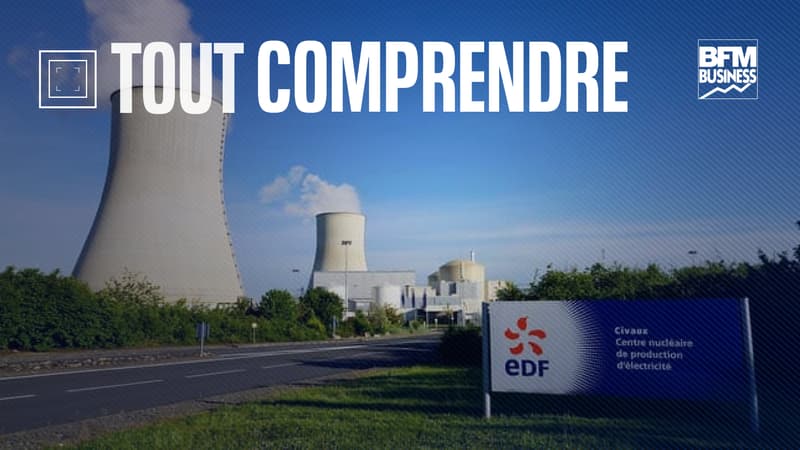This is one of Emmanuel Macron’s strong formulas in his presentation this Monday of the government’s “ecological planning.” “In October we will be able to really announce electricity prices that are compatible with this competitiveness and that will give visibility to both our homes and our industrialists,” declared the President of the Republic. We will resume here, at the end of the year, control over the prices of our electricity at the French and European level.” But behind this ambitious lexical field, what does such a commitment mean in concrete terms?
How is this price control necessary for the electrification strategy?
If the executive wants cheap electricity it is because he is the spearhead of the energy transition. Among the measures mentioned on Monday, Emmanuel Macron wants to produce one million electric vehicles in France by 2027, as well as one million heat pumps, that is, three times more than today. The Head of State also announced investments of 700 million euros in the construction of 13 metropolitan RERs. Finally, the President of the Republic also wants to accelerate the decarbonization of the 50 most polluting industrial sites and reduce their emissions by 45% by 2030.
However, the role of manufacturers is fundamental in this electrification strategy. “Electrification is a way to control your energy, its cost and above all its rate of increase in power,” Xavier Barbaro insisted on Tuesday on the set of BFM Business. The CEO of Neoen denounces in particular a “French administrative millefeuille that moves at full speed” and wastes precious time in the implementation of renewable energy projects, in particular solar, which must concentrate efforts while waiting for commissioning. of future nuclear reactors. after 2035.
Why are relations between the executive and EDF not good?
The battle is fought between Emmanuel Macron and Luc Rémont. After a summons last week in Matignon and the report published by Agnès Pannier-Runacher on the cost of nuclear energy, the head of EDF was given a period of 15 days to set the lowest possible average price of electricity. The ax should fall in early October.
While Europe works on a reform of the electricity market, the executive wants a competitive price for companies and visibility for households in line with the Energy Regulatory Commission’s valuation of 60 euros per MWh and, therefore, well below of the price requested by Luc Rémont of about 90 euros per MWh.
The two sides are in a real war of positions and EDF cannot ignore its financial situation. In addition to the new EPR and the extension of the useful life of the power plants, which will require annual investments of 25 billion euros, the group is already burdened with around sixty billion euros of debt and 18 billion euros of losses. registered last year.
What are the problems at national and European level?
The expression “regain control of our electricity prices at the French and European level” can have several meanings and comes a few days after the Minister of Economy and Finance, Bruno Le Maire, indicated that the regulated sales tariff would not experience a reduction. increase of more than 10% in February, which expands the tariff shield.
On a national level, the State could therefore impose a sales price, which echoes the tough discussion between Élisabeth Borne and Luc Rémont: the Prime Minister wants the lowest possible price, while the head of EDF claims who runs a company that depends on a market price. However, it is the State that will have the last word, since the renationalization of the company was completed a few months ago.
At the European level, the formula used by Emmanuel Macron can refer to the reform of the current functioning of the European energy market, which operates according to a marginal cost pricing principle: the last unit of electron produced gives the price to the entire market. . Today it is gas that has priority, which means that the price of electricity in Europe has increased significantly, since the price of gas rose especially last year.
Discussions around this reform of the European energy market are marked by significant tensions between France and Germany and are unlikely to lead to an agreement next month.
How will this price control translate?
According The Parisian, the executive is considering an option so that households and companies have access to the real cost of nuclear electricity: a mandatory tax on a part of the profits obtained by EDF. This “nuclear income” would then be entirely redistributed between households and companies.
Specifically, it would be about using the “difference rate”, that is, guaranteeing remuneration to the producer and a fixed price to the consumer. Depending on the market, if the producer makes profits, he pays part of them to the State and if the producer makes losses, the State pays him money, which ensures a fixed price in the market.
On Tuesday morning, the Minister of Energy Transition, Agnès Pannier-Runacher, indicated that the government will present two laws on energy matters before the end of the year, one on nuclear security reform, another on the climate and a “system sustainable” that allows “to maintain electricity prices among the lowest in Europe.”
Source: BFM TV


